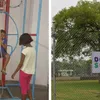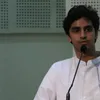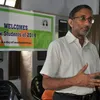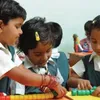How this 22-year-old is providing free supplementary education to children in villages of Tamil Nadu
Nukkad Patshala began by providing free after-school learning in Coimbatore, Tamil Nadu, to encourage children to continue schooling and reduce the gross dropout ratio. In five years, Krutika Rao has scaled to 38 centres that impact the lives of 1,500 students.
Poverty, availability and accessibility are the three main reasons children drop out of schools in India. A study conducted by the Ministry of Human Resource Development (MHRD) reveals that 62.1 million children are out of schools across India. The 2011 Census estimated the figure at 84 million - nearly 20 percent of the age group covered under the Right to Education Act (RTE).
It was to bring about change at the grassroot level that Krutika Rao and her father, Ganesh Rao, launched Tamil Nadu-based Nukkad Pathshala in February 2014. The non-profit CSR initiative aims to prevent children at nukkads, in villages, from dropping out of school by offering quality education for free at after-school learning centres.
Krutika, the Co-founder of Nukkad Pathshala, says, “For every 100 students who enter primary school in India, only 25 end up graduating from college.”

Ganesh Rao and Krutika Rao
Her initiative has scaled up over the last five years, growing to 38 centres across Tamil Nadu: Salem, Coimbatore, Namakkal, Thanjavur, Tuticorin, Trichy, and Udumalpet. The nine-member team is currently impacting the lives of 1,500 students.
Walking the talk
The idea for Nukkad Pathshala was germinated when 22-year-old Krutika, who graduated from HR College of Commerce and Economics with a major in accounting and finance, was taking a stroll with her father in Mumbai.
The father-daughter duo saw a large number of students running out from a shanty. Upon inquiring they found out that it was a tuition centre, where kids from nearby slums came to study.
To Krutika and her father, education was equivalent with good infrastructure. This incident completely changed their outlook.

The Nukkad Pathshala Team
Extensive research led Krutika to realise that a number of students drop out of schools either due to financial constraints, socio-cultural barriers, and gender disparity, or simply because they were unable to cope with the fast pace of the education system.
“My father runs a microfinance company, New Opportunity, and has a huge outreach in various villages across India. We realised the undiscovered opportunity in our hands with this outreach, which could help us make a positive impact among students across rural India. Keeping that in mind, we started our first Nukkad Pathshala in Nethaji Nagar Centre, Coimbatore, in 2014,” she recalls.
The motivation, she says, was to encourage children to continue schooling and help reduce the gross dropout ratio.
Nukkad Pathshala was started with the company's CSR funds. “For specific causes, for example, to set up a library in every centre, we organised a fund-raising campaign. Currently, we are able to cover the cost of all centres. However, we are planning another campaign to digitise all our classrooms,” Krutika says.

Children enjoy after-school classes at a Nukkad Pathshala.
What is Nukkad Pathshala?
The Nukkad Pathshala is a free after-school learning centre set up in “nukkads” of villages across India for students from KG to Class 10. It introduces children to foundational math, English, and science, with 38 villages across Tamil Nadu a part of the initiative.
“The only prerequisite for our centres is that they have to be centrally located in the village, and easily accessible to all. In some places, we have been lucky to get a free premise from the panchayat. At others, we do pay a rent to operate,” Krutika says.
The average class size at Nukkad Pathshala is 30-35 students, but some centres have around 70-80 students. Smaller classes have one teacher; larger ones usually have two teachers. The teacher runs two-hour classes from Monday to Saturday. Students are offered hands-on learning for subjects like math and science through experiments and models. This time is also used to clarify school doubts.
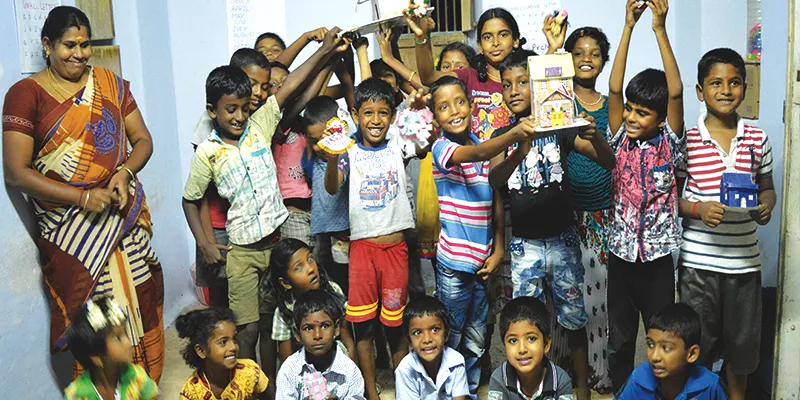
Children engage in 'learning by doing' at a Nukkad Pathshala centre.
The centre also runs interesting programmes like Friday Book Club, which helps bridge educational constraints a student from a rural background might face (such as difficulty in grasping English). The book club gives children exposure to English, and includes setting up libraries with books for different ages at all centres. The teachers read out to the children to help develop reading and communication skills.
“A typical Friday at our Pathshala has students gathered in a circle and talking about the book they read the previous week. This activity is not only helping them learn a new language, but we are starting to see an excited gleam and an increasing sense of curiosity in their eyes each time they pick a new book to read.” Krutika says.
Focusing on values and mentorship
Apart from book club, the Pathshala also has a Value Education programme. An interactive Value Month helps young children understand and reflect on the importance of ethics and values. Every month, the centres choose one value to work on and reinforce, through activities and games, so that children understand the importance of respecting and valuing another.
Krutika says last month the value topic was “kindness”, and children had to make kindness calendars, putting down “one kind task a day”. She recalls that the children loved it so much that they continued for two months despite the task being a weeklong activity.
“We’re looking to develop individuals who will be future leaders. For that, values are as important as a proper education. I believe that no matter how educated a man might be, without values, he has no respect in society. This is why we focus on a student’s development beyond textbooks,” she says.
Another programme, Learning by Doing, teaches students through practical hands on tasks to apply concepts learned in class. Games are also used to help them grasp ideas better, especially in math and sciences.
“This form of teaching has been received positively by our students. We have seen greater understanding, retention power, and genuine curiosity to learn new concepts,” Krutika says.

Nukkad Pathshala Logo
Besides this, the Pathshala also started online mentorship six months ago to help students learn English better.
Krutika says, “Our setup is simple: we put up a projector in the class and the session takes place via a video call. Each week, our mentors read out new stories and focus on students’ pronunciation and grammar. It hasn’t been very long since the programme started, but our students are slowly opening up during class discussions. Their confidence while speaking in English has increased immensely.”
The early challenges
Starting an initiative to educate rural students wasn’t an easy task, Krutika says. But they have slowly managed to overcome them.
“The biggest challenge was to make our teachers and students comfortable with technology and to facilitate online sessions (for the mentorship programme). We are now gradually trying to use many freely available online resources to help increase learning outcomes for our students,” she says.

The co-founder admits that some teachers were a little hesitant when they started working with technology. However, they now proactively share material to use across all centres and even suggest new ideas to make learning a fun experience.
Another challenge is getting girls to attend the after-school sessions, especially after Class 6. “Our centres operate in the evening, and parents often want them to help out with domestic chores during that time. We conduct several sessions to convince parents to continue sending their child,” she says.
Selvi, the mother of Haripriyan, a Class 6 student, says: “I am porter and my husband is a driver. We are working constantly through the day in Thoppapatti village, Salem. Sometimes we hardly have any time with our two children.”
She says her children have benefited immensely by attending classes at Nukkad Pathshala. “He usually goes after his school, and I have noticed an improvement in my son and daughter. They have not only improved in academics, but are also more confident. I am not so worried about their future anymore,” Selvi continues.
Making an impact
According to the founders, 50 percent of Nukkad Pathshala students have shown more than 30 percent improvement in school grades, indicating that their academic performance has significantly improved.
There has been a recorded regular attendance of 86 percent students at the learning centres across Tamil Nadu. As many as 89 percent parents said their child’s confidence levels had significantly increased after attending the classes. Other changes include a positive and healthy attitude towards academics, improvement in public speaking skills, desire to read more, and engage in extracurricular activities.
“Our aim is not only to educate students but to provide them with all-round development since they are the future of this country. Learning should not be confined to textbooks; it should stimulate the brain and tweak their curiosity,” Krutika says.

After attending Nukkad Pathshala classes, children have a positive attitude towards academics.
The road ahead
Nukkad Pathshala is currently in the process of developing low-cost kits for math and science to further encourage “learning by doing” among students.
The team is also working towards an activity-based financial literacy programme for children, and aims to begin with topics like “what is money and how to manage it before proceeding to more complex topics like budgeting”.
“The best part is that all of this will be taught through games and activities so that children can grasp concepts better,” Krutika says.
Plans are afoot to move beyond Tamil Nadu, beginning with Maharashtra. “We want to reach every nukkad in the country,” Krutika says.
(Edited by Teja Lele Desai)


